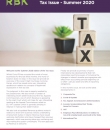In recent years Revenue have paid significant attention to Medical Consultants and, in particular, to those who have incorporated their business. The systematic review, dubbed the “Medical Consultants Project”, began in 2013 and has yielded significant tax settlements over the years. Revenue have recently released further guidance regarding the incorporation of locum practices and some of the stumbling blocks they have identified during the audit of these entities. We have summarised their main points below:
With the exception of VAT, most of the above would apply to any personal service company and not just those providing the services of a locum. Given Revenue’s increased scrutiny in these areas and the hefty interest and penalties being imposed, it is more important than ever that corporation tax returns are prepared correctly and in line with the facts of the situation. As these audits have borne significant fruit from Revenue’s perspective it is unlikely that they will go away in the near future.


Tax Issue - Summer 2020 137.61 KB
Whilst Covid-19 has occupied the minds of most businesses for the last three months, the world of taxation does not stop. In this issue we provide an overview of the recent High Court case involving Perigo, which has raised some very interesting questions in relation to concepts of legitimate expectative in Irish tax law. We also review a number of interesting recent determinations of the Tax Appeals Commissioners. We look at updated Revenue guidance notes in relation to short term business visitors undertaking employment duties in Ireland. Finally we provide a summary of some international tax developments that Irish corporates need to be aware of including the changes in Ireland’s transfer pricing regime with effect from accounting periods beginning on or after 1 January 2020 and DAC 6 reporting obligations.
DownloadOur offices are strategically located to service our market and are easily accessed from any location nationwide.
Termini,
3 Arkle Road,
Sandyford, Dublin,
D18 C9C5, Ireland
RBK Incorporating OMC O'Malley & Company Limited,
Upper Chapel Street,
Castlebar, Co Mayo,
F23 PF21, Ireland
RBK House, Irishtown
Athlone,
Co. Westmeath,
N37 XP52, Ireland
RBK Incorporating MCP Accountants,
Breaffy Road,
Castlebar, Co Mayo,
F23 DY67, Ireland
